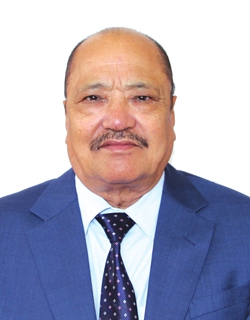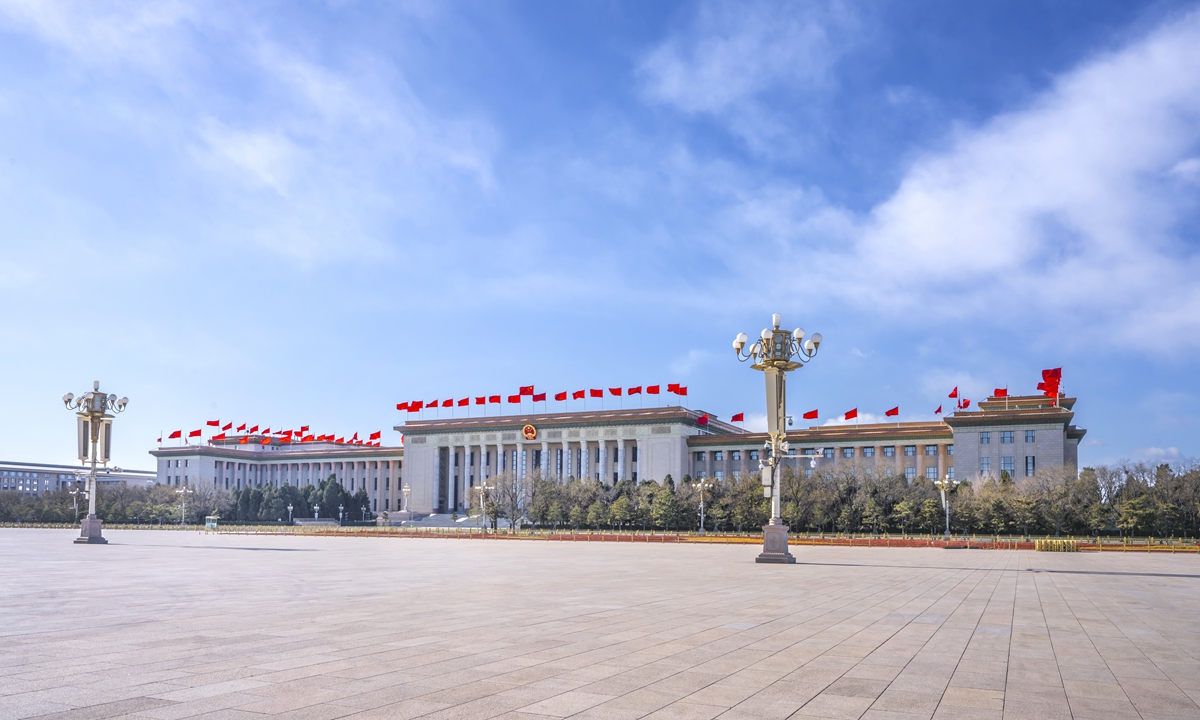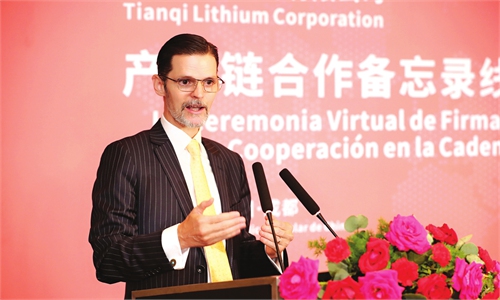IN-DEPTH / DIPLOMATIC CHANNEL
Voting system at China’s two sessions commendable: Nepali envoy
Editor's Note:
The ongoing two sessions - a significant event on China's political calendar - not only carries great significance for China, but also to the world. Diplomats from other countries stationed in Beijing are also closely watching the meetings with many of them trying to take references from China's development path to address the challenges their own countries face. What impressed the diplomats most at this year's two sessions? What cooperation with China do they envision? How do they understand China's modernization path? Global Times reporter Xie Wenting talks with Argentine Ambassador to China Sabino Vaca Narvaja and Nepali Ambassador to China Bishnu Pukar Shrestha on those topics.
His first direct encounter with the two sessions - one of China's most important political events - left Nepali Ambassador to China Bishnu Pukar Shrestha highly impressed and he could not help but commend the voting system used at the two sessions, which he viewed as a remarkable way to ensure democracy.

"The significance of the two sessions for Nepal is obvious," he said. He expressed confidence that the bilateral ties between China and Nepal will grow further after the two sessions.
Shrestha attended the opening meeting of the first session of the 14th National Committee of the Chinese People's Political Consultative Conference (CPPCC) on Saturday and the opening meeting of the first session of the 14th National People's Congress (NPC) on Sunday.
This is the first time the Nepali diplomat participated in the two sessions after assuming office in 2022.
"We look forward to exchanging high-level visits with China," Shrestha told the Global Times.
Asked about his feelings about attending the two sessions, Shrestha said he was "truly impressed" by the Government Work Report delivered by Premier Li Keqiang on behalf of the State Council, China's cabinet, and was "moved" by the work report delivered by Wang Yang, chairman of the 13th CPPCC National Committee, to the CPPCC National Committee session.
He noted that he was also impressed by the voting system at the two sessions, which is "commendable."
"I am also greatly impressed by the voting system on the presented reports which were adopted by the majority of votes from NPC deputies." he said. "The voting system in a socialist country is really commendable to ensure democracy while keeping people first and at the center. I am also impressed by the participation of about 26 percent of female representatives at the NPC session," he noted.
The voting history of the Communist Party of China (CPC) dates back to the 1940s when an innovative method of mobilizing rural people to exercise their voting rights through casting beans as their ballots was created. This legacy of democratic practices evolved into the whole-process people's democracy as it is seen today, in which an advanced balloting system is practiced in the people's congresses at all levels.
According to the senior Nepali diplomat, many parts of the Government Work Report highly impressed him. One such point in the report was on how China has successfully eradicated absolute poverty under the strong leadership of Xi Jinping and accomplished its first centennial goal of building a moderately prosperous society in all respects. Additionally, he referred to the parts of the 20th CPC National Congress and how China's effective COVID-19 response secured great outcomes.
On the economic front, he focused on how China advanced supply-side structural reform and implemented a full range of policies and measures to stabilize the economy as well as China's GDP target.
"China employed the use of innovative science and technology so as to keep the market prices stable and ensure market supply," he said. "What is important for Nepal is China's resolution to further open up via various initiatives such as the Belt and Road Initiative [BRI] and the Global Development Initiative [GDI] that focus on the common prosperity of mankind."
Shrestha expressed his high expectations for economic cooperation between China and Nepal.

Nepal will continue to collaborate with China in various sectors including the Nepal-China Trans-Himalayan Multi-dimensional Connectivity Network under the BRI, railway connectivity, transmission lines, hydropower, agriculture, infrastructure, information and technology, trade, tourism, investment, education, and mining, among others, noted Shrestha.
However, economic cooperation between the two countries which aims to improve people's livelihoods has been under attacks by naysayers and some Western media outlets, who claim that the joint programs, especially the China-Nepal railway project, will drag Nepal into the so-called debt trap.
Shrestha dismissed the "debt trap" allegation. He told the Global Times in a previous interview that he did not see any potential for a "debt trap," since no discussions of loans or debts have been part of the China-Nepal Railway project.
"Those who have written such things might have been misinformed," he said.
In addition to economic cooperation, the ambassador is also eyeing deeper people-to-people exchanges.
"Since China has optimized its COVID-19 response, now Chinese tourists can visit Nepal to promote Nepal's tourism. Likewise, Nepali people can visit China for multiple purposes such as tourism, study, and trade among others," he said. "I can happily state that Nepal-China relations will be further promoted in the coming days."
During the interview, he congratulated China for having nurtured the concept of "a global community of shared future" for a decade.
He said he is "consent" to the philosophy of win-win cooperation that China has been proposing.
"Both countries have a shared future and can share common prosperity which will inevitably contribute to the greater good of the people of the world," he said.
"The exchange of tourists from both countries will help boost the tourism industry in both Nepal and China. It will also enhance socioeconomic development and people-to-people relations. Exchanges in the education sector will strengthen academic ties between the two nations. More importantly, trade relations between both the two countries can be promoted to play a significant role in economic growth in both countries," he remarked.
The ongoing two sessions - a significant event on China's political calendar - not only carries great significance for China, but also to the world. Diplomats from other countries stationed in Beijing are also closely watching the meetings with many of them trying to take references from China's development path to address the challenges their own countries face. What impressed the diplomats most at this year's two sessions? What cooperation with China do they envision? How do they understand China's modernization path? Global Times reporter Xie Wenting talks with Argentine Ambassador to China Sabino Vaca Narvaja and Nepali Ambassador to China Bishnu Pukar Shrestha on those topics.
His first direct encounter with the two sessions - one of China's most important political events - left Nepali Ambassador to China Bishnu Pukar Shrestha highly impressed and he could not help but commend the voting system used at the two sessions, which he viewed as a remarkable way to ensure democracy.

Nepali Ambassador to China Bishnu Pukar Shrestha Photo: Courtesy of Nepali Embassy in Beijing
"The significance of the two sessions for Nepal is obvious," he said. He expressed confidence that the bilateral ties between China and Nepal will grow further after the two sessions.
Shrestha attended the opening meeting of the first session of the 14th National Committee of the Chinese People's Political Consultative Conference (CPPCC) on Saturday and the opening meeting of the first session of the 14th National People's Congress (NPC) on Sunday.
This is the first time the Nepali diplomat participated in the two sessions after assuming office in 2022.
"We look forward to exchanging high-level visits with China," Shrestha told the Global Times.
Asked about his feelings about attending the two sessions, Shrestha said he was "truly impressed" by the Government Work Report delivered by Premier Li Keqiang on behalf of the State Council, China's cabinet, and was "moved" by the work report delivered by Wang Yang, chairman of the 13th CPPCC National Committee, to the CPPCC National Committee session.
He noted that he was also impressed by the voting system at the two sessions, which is "commendable."
"I am also greatly impressed by the voting system on the presented reports which were adopted by the majority of votes from NPC deputies." he said. "The voting system in a socialist country is really commendable to ensure democracy while keeping people first and at the center. I am also impressed by the participation of about 26 percent of female representatives at the NPC session," he noted.
The voting history of the Communist Party of China (CPC) dates back to the 1940s when an innovative method of mobilizing rural people to exercise their voting rights through casting beans as their ballots was created. This legacy of democratic practices evolved into the whole-process people's democracy as it is seen today, in which an advanced balloting system is practiced in the people's congresses at all levels.
According to the senior Nepali diplomat, many parts of the Government Work Report highly impressed him. One such point in the report was on how China has successfully eradicated absolute poverty under the strong leadership of Xi Jinping and accomplished its first centennial goal of building a moderately prosperous society in all respects. Additionally, he referred to the parts of the 20th CPC National Congress and how China's effective COVID-19 response secured great outcomes.
On the economic front, he focused on how China advanced supply-side structural reform and implemented a full range of policies and measures to stabilize the economy as well as China's GDP target.
"China employed the use of innovative science and technology so as to keep the market prices stable and ensure market supply," he said. "What is important for Nepal is China's resolution to further open up via various initiatives such as the Belt and Road Initiative [BRI] and the Global Development Initiative [GDI] that focus on the common prosperity of mankind."
Shrestha expressed his high expectations for economic cooperation between China and Nepal.

The Great Hall of the People Photo: VCG
"Connectivity, transportation, and development of infrastructure would help promote the [people's] interests. Likewise, prominent trade events including the China International Import Expo [CIIE], China International Fair for Trade in Services [CIFTIS], and China International Consumer Products Expo provide platforms to intensify trade relations between Nepal and China," he said.Nepal will continue to collaborate with China in various sectors including the Nepal-China Trans-Himalayan Multi-dimensional Connectivity Network under the BRI, railway connectivity, transmission lines, hydropower, agriculture, infrastructure, information and technology, trade, tourism, investment, education, and mining, among others, noted Shrestha.
However, economic cooperation between the two countries which aims to improve people's livelihoods has been under attacks by naysayers and some Western media outlets, who claim that the joint programs, especially the China-Nepal railway project, will drag Nepal into the so-called debt trap.
Shrestha dismissed the "debt trap" allegation. He told the Global Times in a previous interview that he did not see any potential for a "debt trap," since no discussions of loans or debts have been part of the China-Nepal Railway project.
"Those who have written such things might have been misinformed," he said.
In addition to economic cooperation, the ambassador is also eyeing deeper people-to-people exchanges.
"Since China has optimized its COVID-19 response, now Chinese tourists can visit Nepal to promote Nepal's tourism. Likewise, Nepali people can visit China for multiple purposes such as tourism, study, and trade among others," he said. "I can happily state that Nepal-China relations will be further promoted in the coming days."
During the interview, he congratulated China for having nurtured the concept of "a global community of shared future" for a decade.
He said he is "consent" to the philosophy of win-win cooperation that China has been proposing.
"Both countries have a shared future and can share common prosperity which will inevitably contribute to the greater good of the people of the world," he said.
"The exchange of tourists from both countries will help boost the tourism industry in both Nepal and China. It will also enhance socioeconomic development and people-to-people relations. Exchanges in the education sector will strengthen academic ties between the two nations. More importantly, trade relations between both the two countries can be promoted to play a significant role in economic growth in both countries," he remarked.



